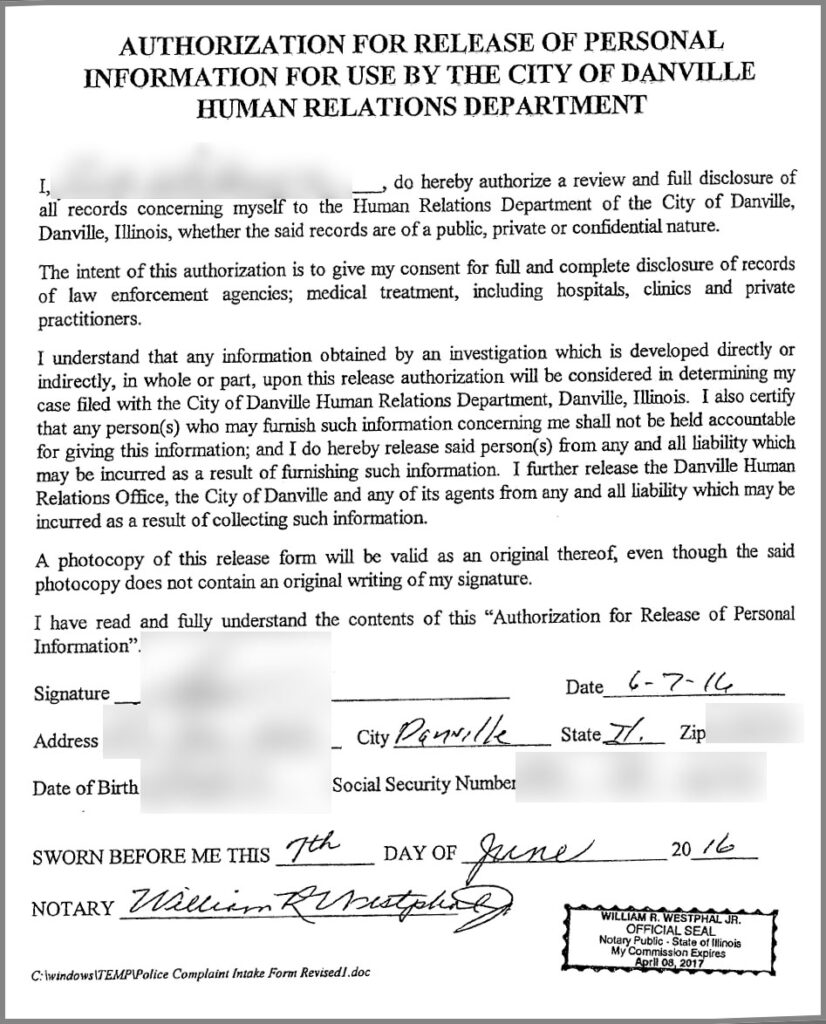
Check CU recently published an article about the Danville, Illinois Police Department utilizing unlawful requirements in their civilian complaint forms. The article showed that the complaint form requires a sworn affidavit, and also requires complainants to supply personal information, such as their date of birth and social security number.
Through a recent Freedom of Information Act (FOIA) request, Check CU has learned that the City of Danville is apparently not terribly concerned with protecting the privacy of civilians who file complaints against their police officers.
On January 25th, Danville City Clerk and Freedom of Information Officer Lisa Monson provided 6 years of police complaints. The document was 353 pages in length, and the extent of private information provided therein was rather disturbing.
Some of the records had redactions, but Danville displayed the names of complainants and witnesses 269 times, as well as 115 signatures, 26 home addresses, 9 personal telephone numbers, and 3 social security numbers and dates of birth.
An example of the information released is shown below (sensitive information blurred out by Check CU). The form shows the complainant’s name, signature, address, date of birth and social security number. The notary who stamped the form is William Westphal – FOIA Administrator for the Danville Police Department.

FOIA does not require a public body to redact private information, but most public bodies will opt to do so, especially with sensitive information. Just sixteen months ago, Danville City Attorney James Simon (working as Urbana City Attorney at the time) stated in a public meeting that if his home address were ever released through FOIA, he would sue the City:
James Simon: “So they FOIA, ‘give me Jim Simon’s home address’. That’s personal and private information. I guarantee you, if that happened, I would be in court in about 8 minutes to prevent that, and if I was too late to prevent it, I’d be set seeking hefty damages.”
It seems public officials are far more concerned with shielding their own information, public and private, than they are about safeguarding the private information of civilians. It should be noted that when Check CU sent the FOIA request to the City of Danville, the request indicated that responsive documents would likely be posted online for public view (which will, of course, not be the case for the Danville records, given the sensitive contents).
Requiring a civilian complainant to disclose so much personal (and arguably irrelevant) information very likely deters many civilians who may wish to file a police complaint. With an understanding that their personal information would not be safeguarded, it is hard to imagine that any person would be willing to submit a complaint.

Indeed, anonymous complaints are lawful.
Simon did not say: ‘Not redacting properly is on par with redacting improperly.’ To provide for the lack of care and/or discipline, please consider appealing the City of Danville’s FOIA response to the attorney general’s public access counselor.
As noted, FOIA does not necessarily require public bodies to redact private information. In fact, the vast majority of redactions and exemptions cited by public bodies are entirely optional. However, inconsistencies in redactions and exemptions can render the public body exposed to lawsuits. For example, if a public body exempts and redacts records for particular requesters, but not for others, then a lawsuit or PAC review would likely reveal a violation. Individuals having their private information, such as social security numbers, publicly released may have grounds for filing a complaint under a non-FOIA cause of action.
Your mention of James Simon has prompted an addition to this article, noting some Simon-specific inconsistencies regarding FOIA redactions.
I seem to remember another CheckCU article that discussed a city of Urbana FOIA response which also disclosed private information. Was retaliation discussed in that article? At any rate, I gather that disclosing private information happens too often.
While improper, let’s assume that redacting certain complainant’s private information while not redacting others in the FOIA response discussed in this article was done in error. That’s a decent failure mode to put forward, I believe. With that in mind, it is my understanding that, at a minimum, Freedom of Information Officer Lisa Monson would benefit from the AG’s official feedback.
Experience indicates that such a venture would result in the following: the PAC would issue a determination that the FOIA does not explicitly require Danville to redact private information, but it is strongly encouraged to protect sensitive information. Danville’s Mayor and City Attorney would then take that determination and loudly proclaim “the PAC said we’re doing everything correctly!”
Perhaps this is the article you seek: https://edgarcountywatchdogs.com/2021/04/urbanas-administrator-carol-mitten-retaliates-after-ag-opinion-publishes-victims-home-and-email-addresses/
Yes, that’s the news article I’m referring to…photo credit to Check CU. Thank you.
That could be likely representation, but at least the PAC would have an opportunity to be appraised, and to provide feedback to the FOIA officer.
If the redactions are not in error, then the redactions discriminate on private information, and that’s awful unlawful.